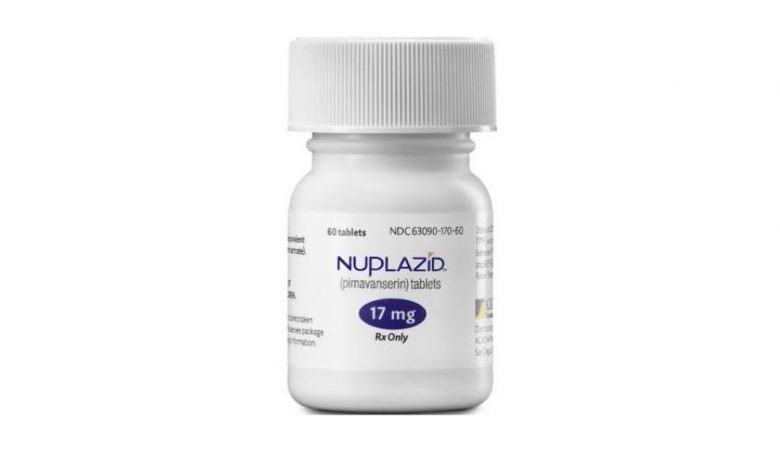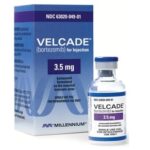Pimavanserin (Nuplazid): Uses, Mechanism of Action, Dosage, Side Effects

What Is Pimavanserin (Nuplazid) And What Does It Treat?
Pimavanserin (Nuplazid) is an antipsychotic medication approved in 2016, by the U.S. Food and Drug Administration specifically to treat hallucinations and delusions associated with Parkinson’s disease psychosis.
Hallucinations can affect any sense. They involve seeing, hearing, feeling, smelling, or tasting something that is not actually there. They happen when an individual is awake. Delusions are less common than hallucinations, affecting around 8% of those with Parkinson’s disease. They are more common in advanced Parkinson’s disease.
Delusions are thoughts, beliefs, or worries that are not based on reality and that are unusual for the person. They may be more complicated and challenging to treat than hallucinations.
How Pimavanserin (Nuplazid) works
Pimavanserin (Nuplazid) is a selective serotonin inverse agonist, it reduces the number of hallucinations and delusions in people with Parkinson’s disease without affecting movement. The exact mechanism in which Pimavanserin (Nuplazid) works to help with Parkinson’s disease psychosis is unknown but thought to help with psychosis by blocking certain serotonin receptors.
What Is The Most Important Information I Should Know About Pimavanserin (Nuplazid)?
A person with Parkinson’s disease may begin to have delusions or hallucinations. These symptoms may continue to occur throughout the illness. Do not stop taking Pimavanserin (Nuplazid), even when you feel better.
With input from you, your health care provider will assess how long you will need to take the medicine.
Missing doses of Pimavanserin (Nuplazid) may increase your risk for a relapse in your symptoms.
Do not change your dose of Pimavanserin (Nuplazid) without talking to your healthcare provider.
For Pimavanserin (Nuplazid) to work properly, it should be taken every day as prescribed by your healthcare provider.
What Should I Discuss With My Healthcare Provider Before Taking Pimavanserin (Nuplazid)?
• Symptoms of your condition that bother you the most.
• If you have thoughts of suicide or harming yourself
• Medications you have taken in the past for your condition, whether they were effective or caused any adverse effects.
• All other medications you are currently taking (including over-the-counter products, herbals, and nutritional supplements) and any medication allergies you may have
• If you experience side effects from your medications, discuss them with your provider.
• Some side effects may pass with time, but others may require adjustments in the medication.
• Any psychiatric or medical problems you have, such as heart rhythm problems, long QT syndrome (irregular heartbeat), or heart attacks
• If you are pregnant, plan to become pregnant, or are breast-feeding
• If you smoke, drink alcohol, or use illegal drugs.
• If you have liver disease or kidney disease.

How Should I Take Pimavanserin (Nuplazid)?
The recommended dose for Pimavanserin (Nuplazid) is 34 mg, usually taken as two 17mg tablets, once daily with or without food.
Use a calendar, pillbox, alarm clock, or cell phone alert to help you remember to take your medication. You may also ask a family member or a friend to remind you or check in with you to be sure you are taking your medication.
What Happens If I Miss A Dose Of Pimavanserin (Nuplazid)?
If you miss a dose of Pimavanserin (Nuplazid), take it as soon as you remember, unless it is closer to the time of your next dose.
If it is close to the time for your next dose, skip the missed dose and go back to your normal time.
Do not double your dose (e.g. take more than 34 mg total) or take more than prescribed.
What Should I Avoid While Taking Pimavanserin (Nuplazid)?
Avoid drinking alcohol or using illegal drugs while you are taking Pimavanserin (Nuplazid). They may decrease the benefits (worsen your confusion) and increase adverse effects (sedation, nausea) of the medication.
What Happens If I Overdose With Pimavanserin (Nuplazid)?
If an overdose occurs, call your doctor or 911. You may need urgent medical care. You may also contact the poison control center at 1-800-222-1222.
A specific treatment to reverse the effects of Pimavanserin (Nuplazid) does not exist.
How Long Does It Take For Pimavanserin (Nuplazid) To Work?
It is very important to tell your doctor how you feel things are going during the first few weeks after you start taking Pimavanserin (Nuplazid). It may take several days to see symptoms improve after you start Pimavanserin (Nuplazid). It may take up to 2 weeks to see significant changes in symptoms.
• Hallucinations and delusions may improve in the first 1-2 weeks
• Sometimes these symptoms do not completely go away
• Symptoms will continue to get better the longer you take Pimavanserin (Nuplazid).
• It may take a couple of months before feeling the full benefit of Pimavanserin (Nuplazid).
Can a pregnant or breastfeeding woman take Pimavanserin (Nuplazid)?
Pregnancy is uncommon in people with Parkinson’s disease. There is no information on Pimavanserin (Nuplazid)’s use in pregnant women that would help predict the risk of serious side effects to an unborn child. If you are planning on becoming pregnant, notify your healthcare provider to best manage your medications. It is important to discuss the risks and benefits of treatment with your doctor and caregivers.
There is no information regarding Pimavanserin (Nuplazid) in lactation, therefore, caution should be advised when breastfeeding.
What Are The Possible Side Effects Of Pimavanserin (Nuplazid)?
Pimavanserin (Nuplazid) may cause side effects. Tell your doctor if any of these symptoms are severe or do not go away:
• nausea
• swelling of hands, ankles, or feet
Some side effects can be serious. If you experience any of these symptoms, call your doctor immediately or get emergency medical treatment:
• confusion
• difficulty walking normally
• hallucinations (seeing things or hearing voices that do not exist)
• hives
• rash
• shortness of breath
• swelling of the tongue
• throat tightness
Pimavanserin (Nuplazid) may cause other side effects. Call your doctor if you have any unusual problems while taking this medication.
Is Pimavanserin (Nuplazid) a safe medication?
This medicine is safe when used as prescribed. However, patients who take Pimavanserin (Nuplazid) may be at risk for a certain type of arrhythmia (irregular heartbeat). To lower this risk, this medication should be used in the smallest effective dose when the benefits outweigh the risks. Your doctor may order an EKG to monitor for an irregular heartbeat.
Allergic reaction is a risk to any component of Pimavanserin (Nuplazid). The patient should watch for signs of an allergic reaction such as wheezing, chest tightness, itching, swelling of the face or lips.
Are There Any Risks For Taking Pimavanserin (Nuplazid) For Long Periods Of Time?
None have been reported at this time.
What Other Medications May Interact With Pimavanserin (Nuplazid)?
The following medications may increase the risk of an arrhythmia (irregular heartbeat) when taken with Pimavanserin (Nuplazid):
• Antipsychotics, including chlorpromazine (Thorazine®), thioridazine (Mellaril®), asenapine (Saphris®), iloperidone (Fanapt®), paliperidone (Invega®), and quetiapine (Seroquel®)
• Antiarrhythmics (heart rhythm medications), including procainamide, quinidine, amiodarone (Cordarone®), dronedarone (Multaq®), and sotalol (Betapace®)
• Antibiotics, including moxifloxacin
The following medications may increase the levels and the effects of Pimavanserin (Nuplazid):
• Itraconazole, Ketoconazole, Clarithromycin, Indinavir
The following medications may decrease the levels and the effects of Pimavanserin (Nuplazid):
• Rifampin, Carbamazepine, Phenytoin, St. Johns Wort.





